
- Home
- Memories
- Scrapbook ▽
- Topics ▽
- People ▽
- Events
- Photos
- Site Map
- Timeline
Page updated 25th May 2015
With thanks to Richard Holladay for his help with this page.
Return to Exeter Cinemas
 Of the three purpose
built cinemas in Exeter that were constructed in the 1930's, the
Gaumont was the earliest when it was opened.
Of the three purpose
built cinemas in Exeter that were constructed in the 1930's, the
Gaumont was the earliest when it was opened.
The cinema, designed by William H Watkins, could accommodate an audience of 1,499 in what was known as a stadium-type layout in which the stalls and circle were on the same, raked floor. The walls of the auditorium were covered with painted panels showing Mediaeval life with a ceiling dominated by a central dome of ribbed plaster and a central light. In common with most other cinemas of the 1930's, it had a grand secondhand, 2 manual, 9 rank Wurlitzer organ installed to entertain the audience between shows and in the intervals, and the 'Ardenie Earphones' system fitted to the seats for the use of the deaf.
It was originally called the Gaumont Palace under its owners, the Gaumont British Picture Corporation, who were partners with Albany Ward, the owners of the Palladium Cinema, Paris Street. The Gaumont was their answer to the opening, in 1931, of the Plaza in London Inn Square. When, in the 1950's Gaumont merged with the owners of the Odeon, the Rank Organisation, it became known as the Gaumont Theatre. Unlike the Plaza, the Gaumont was purpose built, with its architect, William Henry Watkins FRIBA of Bristol, and designer Percy Bartlett, creating an unusual Scandinavian, Art Deco hybrid. The Gaumont-British Picture Corporation appointed Mr Ralph M Leddra, previously manager of the Palladium, Paris Street, as manager.
The cinema was opened on Whit Monday, 16th May 1932, by Arthur C Reed MP for Exeter. Built on a site off North Street, it had a grand entrance gate on the street itself that opened into the courtyard in front of the cinema. The site was cramped and had previously been occupied by the Yacht Beverage Co Ltd, a producer of fizzy drinks.
Arthur Reed, who opened the cinema said "The new cinema has a spacious forecourt, and the structure is steel frame and fire-resisting. There is seating accommodation for 1,500 people, and the screen can seen in comfort from every part of the house. An organ has been installed, and the organist for the opening performances has been (Fredric) Bayco. Reproduction at the first performances was flawless, and all dialogue came through clearly. "
The first films to be shown were the 80 minute musical, Sunshine Suzie, starring Owen Nares and Jack Hulbert, and the 47 minute long, Once Bitten with Ursula Jeans. The newly developed sound system was by British Acoustic Films Ltd. At that time, the typical cost of going to the cinema was 2/- (10 pence) for the Front Circle, 1/6 for the Back Circle, 1/- for the Centre Stalls and 7d (3 pence) for the Front Stalls. Performances were continuous between 2.30 and 10.30 daily.
The cinema had several organists through the 1930s:
Douglas Walker - known as the "Wonder Boy Organist," was the, 20 year old first resident, until about September 1933.
Edward Harold - September 1933 to September 1934.
Kenneth Arthur - September 1934 until 1936. He broadcast on the West Regional programme. See photo right.
Harold Balaam - organist from 1936. See photo right.
Around about 1936, the organ had an illuminated console added.
In 1932, Frankenstein starring Boris Karloff was released in Britain, to some controversy due to its so called, horror. The Watch Committee prevented the film showing at the Gaumont, forcing the Exeter public to travel to the Rex, at Topsham, where it was being screened. In its place, for the week, was shown Murders in the Rue Morgue, about the murder of a prostitute.
Recession hit in the 1930s, increasing the unemployment figures. Cinemas did a good trade, as they were a relatively cheap way of forgetting hard times. The management of the Gaumont staged a non-stop variety performance, in March 1934, in aid of the unemployed. Edward Harold played the Wurlitzer organ, while a variety of singers performed songs and humorous patter. On the 25 March, a lecture was given on Christian Science by Miss Margaret Murny Glen of Boston, Massachusetts – religion was the other way of forgetting hard times, for some. The Exeter branch of the Christian Scientists, continued to hold lectures at the Gaumont, through the middle 1930s.
In 1937 the name of the cinema was changed from Gaumont Palace to just Gaumont. The St Thomas Carnival used the Gaumont for their Miss Exeter competition in September 1934, which was won by Miss Winifred Mallett, 18 years of age.
The cinema was also used to show safety first films to Exeter's school children and promotional films for local businesses such as the Austin dealer Philip Pike.
The cinema suffered some damage during the bombing of 4th May 1942, with its main ceiling collapsing. The report stated:
"North St. Direct hit on Gaumont Cinema. B(last) damage to the rear of the cinema. C(onsiderable) damage to School, 100' from impact."
The organ was badly damaged in the raid, with the console being destroyed, but the pipes were undamaged, and are the only surviving part now in preservation at the Burtey Fen Archive.
The cinema reopened on 24th May 1943 after extensive repairs, although the organ was damaged and had to be removed. The programme was "The War Against Mrs. Hadley" and the Abbot and Costello comedy "Pardon My Sarong" – "A really topline opening, you'll agree", as the Gazette stated.
In 1946, the cinema employed 46 personnel with managers, projectionists, front of house staff and usherettes. All the staff with contact with the public wore uniforms.
When the film, Rock Around the Clock was shown during the 1950's, the audience leapt into the aisle and started to dance, much to the consternation of the staff and against local authority by-laws. The Gaumont also ran a Saturday morning children's club with cartoons, comedies and the inevitable, cliff hanger serial. The proceedings were organised by Mrs Neale, known as "Auntie Rose", of Barley Mount who was from a showbiz family. Two of her daughters became dancers in the Westend, and her son was the singer Colin Day. The noise must have been deafening as 700 children would sing the club anthem before the show.
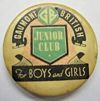
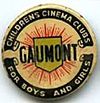
 We come
on Saturday mornings
We come
on Saturday mornings
Greeting everybody with a smile
We come along on Saturday mornings
Knowing it's well worth while
As members of the Gaumont 'Club'
We all intend to be
Good citizens when we grow up
And champions of the free
We come along on Saturday Mornings
Greeting everybody with a smile
Smile, SMILE!
Greeting everybody with a smile.
The advent of television dealt a blow to cinema and when Westward TV and BBC TV opened in the westcountry, the writing was on the wall for many cinemas. The Gaumont was converted into the Top Rank Bingo and Social Club in 1963, when Tommy Trinder and Westward TV presenter Shelagh Kennedy performed the opening ceremony. Not everyone approved, and it was said that as Trinder was in the manager's office after the opening, a rock was hurled through the window - his comment at the time was "It must be one of my fans."
The Gaumont survived the wartime bombing, the decline of the cinema and the move into Bingo. Now called the Mecca Bingo, it still provides entertainment to the people of Exeter, and has been Grade II* listed.
Sources - Express and Echo Nostalgia article,Exeter and Plymouth Gazette, albanyward (west country cinema site no longer available) britishpictures.com and memories of visitors to the site.© 2013 David Cornforth - not to be used without permission.
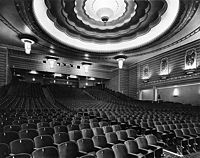
Looking back towards the projection box in 1932. Photo Courtesy of Cinema Theatre Association Archive
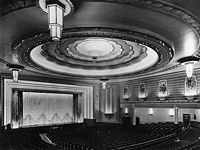
The auditorium in 1932 with the wonderful, circular ceiling. Photo Courtesy of Cinema Theatre Association Archive
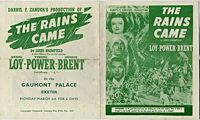
The Gaumont Palace Exeter programme for The Rains Came, in 1939. The film starred Myrna Loy and Tyrone Power, and won one Oscar. Courtesy Dick Passmore.
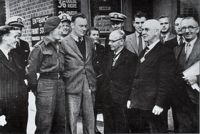
Veterans of the battle of Arnhem were invited to the first showing of Theirs is the Glory, at the Gaumont, Exeter, 1945.
Nicholas Martin plays Exeter's preserved Gaumont Palace Wurlitzer. Courtesy of Burtey Fen Archive